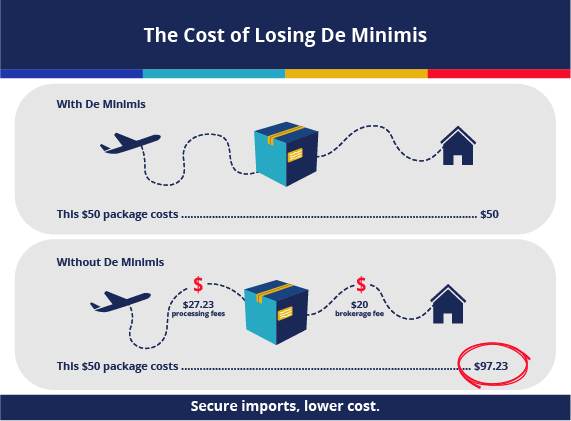E-commerce is undergoing a seismic shift, and if you’re an Amazon seller, the landscape has never been more challenging. Former President Donald Trump recently made a major policy change that, ironically, ended up strengthening companies like Temu and Shein while devastating small Amazon businesses.
For years, Temu and Shein have been dominating the market by leveraging a legal loophole called the D Minimus Rule, allowing them to sell ultra-cheap products directly from China with zero import tariffs. While Trump initially tried to shut this loophole down, his efforts backfired, giving these Chinese giants an even greater advantage.
As a result, Amazon sellers are now facing higher costs, shrinking profit margins, and an uphill battle against unfair competition. With import costs rising and sales dwindling, many Amazon businesses are on the brink of collapse. Some sellers are scrambling to find new strategies, while others are closing their storefronts altogether.
However, there’s still a way to thrive in this new environment—by selling passion products. Unlike generic items that can be easily copied or undercut by Temu and Shein, passion products are unique and niche-specific, allowing sellers to maintain control over pricing and profit margins.
If you’re wondering what’s happening and how to pivot successfully, this article will break everything down in detail. We will explore the D Minimus Rule, Trump’s policy shifts, the current e-commerce climate, and introduce you to the Passion Product Formula, the only strategy that still works in today’s market.

Understanding the D Minimus Rule

The Origin of the D Minimus Rule
To fully grasp the situation, we need to take a brief trip back in time. The D Minimus Rule was first introduced in 1930 as a way to simplify trade. At the time, international trade was far more limited, and customs regulations were often cumbersome and inefficient. The rule was designed to help American tourists bring back small souvenirs and gifts from overseas without being burdened by complicated customs duties.
The rationale was simple: if an item was of low value, it wasn’t worth the government’s time and resources to collect import taxes on it. This made sense in the early 20th century when global trade was far less complex and online shopping didn’t exist. For nearly 90 years, the D Minimus Rule had little impact on large-scale e-commerce because retail sales were dominated by physical stores and domestic businesses. That all changed in 2022 when Temu and Shein discovered how to exploit it.
How Temu and Shein Exploited the Rule
With the rise of global e-commerce, companies like Temu and Shein quickly realized they could bypass traditional trade restrictions by taking advantage of the D Minimus Rule. The rule states that any package valued under $800 can enter the United States without paying import tariffs. This meant that Temu and Shein could ship their products directly to American consumers duty-free, while traditional retailers and Amazon sellers still had to pay import fees on their inventory.
This loophole created an uneven playing field in the market. While Amazon sellers had to factor in shipping costs, import tariffs, and Amazon fees, Temu and Shein could offer rock-bottom prices because they weren’t paying any additional costs. As a result, their sales skyrocketed, while thousands of Amazon sellers struggled to compete.
With the U.S. economy struggling and consumers looking for cheaper options, Temu and Shein flooded the market with low-cost products. Their ability to sell items at 80-90% lower prices than Amazon sellers meant that shoppers naturally gravitated toward their platforms. Amazon sellers simply couldn’t compete, as Temu and Shein were undercutting their prices by over 1,000% in some cases.
Trump’s Attempt to Shut It Down

When Trump returned to office, he saw this as a major threat to American businesses and decided to take swift action. Within his first month back in office, he removed the D Minimus Rule altogether, intending to force Temu and Shein to pay import duties like everyone else. This move was designed to level the playing field and restore fairness to the U.S. e-commerce landscape.
However, this policy shift didn’t last long. Within 10 days, Trump was forced to reinstate the rule due to logistical nightmares.
Why? Because the U.S. logistics system was completely unprepared to handle the 800 million packages affected by this rule every year. Customs officials didn’t have the manpower to inspect each item manually, and shipping companies like UPS and FedEx were overwhelmed with delays. If the rule remained removed, the entire shipping infrastructure would have collapsed.
As a result, Trump had no choice but to reinstate the rule, which meant Temu and Shein could go back to printing money, while Amazon sellers continued to suffer.
Why Amazon Sellers Are Struggling Like Never Before
The Impact of Increased Tariffs

With the D Minimus Rule still in effect, Trump turned to another strategy: tariffs. He believed that by imposing higher import taxes on Chinese goods, he could weaken Temu and Shein while protecting American businesses. As a result, Trump increased import taxes from 25% to 35% on goods from China.
However, there was one major flaw in this plan: Temu and Shein don’t have to pay tariffs! Since they continue to ship under the D Minimus Rule, these Chinese e-commerce giants remain completely unaffected. Meanwhile, Amazon sellers who rely on Chinese suppliers now face a 10% higher import cost.
The effects of this policy were devastating for Amazon sellers. With already thin profit margins, an additional 10% import tax meant that many sellers were now losing money on every sale. Those who tried to pass the cost onto consumers found that customers simply opted to buy from Temu or Shein instead.
The Death of Wholesale and Private Label Selling
These tariff increases have made wholesaling and private labeling nearly impossible on Amazon.
- Wholesalers buy products in bulk and resell them at a markup, but higher tariffs wipe out their profit margins.
- Private label sellers create their own branded versions of existing products, but they can’t compete with Temu’s ultra-low prices.
Amazon sellers who built their businesses on these models are now scrambling to find alternative strategies, with many pivoting to unique products that can’t be easily replicated.
The Two Major Problems for Amazon Sellers
Profit Margins Getting Wiped Out

Amazon sellers have always operated on thin profit margins, but Trump’s new tariff increase has made things even worse. With import taxes on Chinese goods rising from 25% to 35%, many sellers are struggling to stay afloat.
Example: How a 10% Tariff Increase Destroys a Seller’s Bottom Line
Let’s break it down with an example:
- Imagine an Amazon seller sourcing a product from China at $10 per unit.
- Previously, with a 25% tariff, the total import cost was $12.50 per unit.
- With Trump’s new 35% tariff, the cost has now risen to $13.50 per unit.
At first glance, a $1 increase may not seem like a big deal. However, consider that many Amazon sellers operate with a profit margin of just $3-$5 per sale after factoring in Amazon fees, fulfillment costs, advertising, and other expenses. This additional import tax eliminates much of that profit, turning once-profitable businesses into money-losing ventures.
Why Raising Prices Isn’t an Option
You might be thinking: “Why don’t Amazon sellers just raise their prices to offset the higher costs?” Unfortunately, that’s not an option. Here’s why:
- Customers shop for the lowest price. If a seller raises their price from $25 to $30, buyers will simply purchase from a competitor selling at $25 or less.
- Temu and Shein offer much cheaper alternatives. Even if an Amazon seller tries to adjust prices, they cannot compete with the rock-bottom prices offered by Temu and Shein.
- Amazon’s algorithm favors lower prices. Amazon prioritizes sellers with the best price in its Buy Box algorithm, meaning higher-priced listings lose visibility and sales.
The bottom line: Raising prices is a death sentence for Amazon sellers. The only way to survive is by finding a way to sell a product that Temu and Shein can’t undercut.
Temu’s Unstoppable Pricing Power

Temu has completely disrupted the e-commerce landscape by offering massive discounts on almost every product imaginable. It has leveraged its supply chain advantages and the D Minimus Rule to sell items at 80% cheaper prices than Amazon sellers.
The Temu Effect: Selling the Same Product 80% Cheaper
Let’s take another example:
- An Amazon seller lists a portable blender for $50.
- That same exact product is available on Temu for $9.99.
- Since Temu doesn’t pay import tariffs, it can afford to sell at an extreme discount, while Amazon sellers are forced to mark up prices just to break even.
Why No Customer Will Buy an Amazon Product for $100 When Temu Sells It for $27

When faced with two identical products, customers will always choose the cheaper option. If Temu offers the same item for 70%+ less, there’s no reason for a customer to pay a premium on Amazon.
Temu’s strategy is simple:
- Identify top-selling products on Amazon.
- Offer them at a fraction of the price.
- Attract budget-conscious consumers away from Amazon.
Amazon sellers who rely on private labeling or wholesale selling methods are getting completely crushed by Temu. However, there’s still one way to succeed—by selling a unique product that Temu cannot copy.
The Solution: The Passion Product Formula
Why Unique Products Are the Future of E-Commerce
The only way to survive in today’s cutthroat e-commerce environment is by selling a unique product that no one else has. This is where the Passion Product Formula comes in.
A Passion Product is a one-of-a-kind product that solves a specific problem, is highly desirable, and has no direct competition.
How Passion Products Protect Against Tariffs and Competition
- No direct competition → No one can undercut your prices.
- Higher perceived value → Customers are willing to pay a premium.
- Brand loyalty → Customers return because they love the unique offering.
- Immune to Temu’s pricing tactics → Since Temu only sells generic products, it cannot replicate unique, branded items.
Real Success Stories of Passion Products

Many Amazon sellers have already pivoted to passion products and are seeing incredible success. Here are three real-world examples:
- Carnivore Electrolytes – A supplement designed specifically for the carnivore diet, making $100,000 per month.
- High Caffeine Tea – A student launched a niche tea brand and now generates $10,000 per month.
- Berberine Tea – A wellness-focused product earning $4,000 per month passively.
These products don’t compete on price because they are unique and cater to a specific audience.
How to Start Your Own Passion Product Business

Step-by-Step Process to Finding a Winning Product
- Identify underserved markets. Find passionate communities with unmet needs.
- Validate demand before launching. Conduct market research and test interest.
- Create a brand around your unique product. Develop a strong brand identity that customers connect with.
By following this simple formula, sellers can build a profitable and sustainable Amazon business that is immune to Temu’s aggressive pricing.
Why the Passion Product Formula Works in Any Market
- Avoids price wars. Unique products don’t have direct competitors.
- Immune to tariff hikes. Higher import taxes don’t affect demand for exclusive, niche products.
- Protected from Temu’s knockoffs. Since Temu specializes in generic items, it cannot copy highly specialized passion products.
Conclusion: The Only Way Forward in E-Commerce
The world of e-commerce is undergoing a massive transformation, and traditional Amazon selling methods are no longer viable. With Trump’s tariff increases, the D Minimus Rule favoring Temu and Shein, and rising competition, it’s clear that selling generic, easily copied products is a losing battle.
Amazon wholesalers and private label sellers are being crushed under the weight of increasing costs and shrinking profit margins, while Temu and Shein continue to dominate the market with rock-bottom prices. Sellers who fail to adapt will struggle to survive in this new reality.
But here’s the good news: there is still a way to win.
Why the Passion Product Formula Is the Only Strategy That Works
In this new landscape, the only sustainable way to build a successful e-commerce business is by creating a unique, high-demand product that Temu and Shein can’t copy or undercut. The Passion Product Formula allows sellers to:
✅ Avoid price wars – No need to compete with Temu’s unsustainable low prices.
✅ Maintain high profit margins – You control the market price for your unique product.
✅ Be immune to tariffs – If necessary, you can manufacture in countries outside China.
✅ Build a long-term brand – A strong brand identity protects you from competition.
This strategy is already working for thousands of sellers who have shifted their approach and are now thriving—even in today’s challenging market.
Frequently Asked Questions (FAQ)
What is the D Minimus Rule, and how does it affect Amazon sellers?
The D Minimus Rule is a U.S. trade regulation that allows packages valued under $800 to enter the country without paying import duties. While originally meant to simplify customs for travelers, Temu and Shein exploit this loophole to ship massive amounts of products duty-free.
This creates an unfair advantage because:
- Amazon sellers must pay import tariffs, increasing their costs.
- Temu and Shein can sell at much lower prices since they avoid these fees.
- The U.S. government collects no import tax revenue from these foreign companies, hurting domestic businesses.
Why did Trump reinstate the D Minimus Rule after removing it?
Trump initially removed the D Minimus Rule to curb the dominance of Temu and Shein, but the decision caused logistical chaos:
- Over 800 million packages per year were suddenly subject to manual customs inspections.
- U.S. customs officials lacked the manpower to process these shipments efficiently.
- Shipping delays skyrocketed, leading to major disruptions for consumers and retailers.
To prevent a full-blown shipping disaster, Trump reinstated the rule, unintentionally allowing Temu and Shein to continue operating without import taxes.
How do Trump’s tariffs impact Amazon sellers?
Trump increased tariffs on Chinese imports from 25% to 35%, intending to hurt Temu and Shein. However, these tariffs only apply to traditional Amazon sellers, not Temu or Shein, because they use the D Minimus Rule to avoid them.
This means:
- Amazon sellers pay significantly higher import costs, reducing their profit margins.
- Temu and Shein continue selling duty-free, making their products even cheaper.
- Many Amazon sellers are forced out of business due to rising costs.
Why can’t Amazon sellers just raise their prices?
Raising prices isn’t a viable solution because:
- Temu and Shein offer the same products at a fraction of the cost. Customers will always choose the cheaper option.
- Amazon’s ranking algorithm favors lower prices. Higher prices lead to lower rankings and fewer sales.
- Consumers are price-sensitive. With inflation concerns, buyers are prioritizing the lowest cost.
What is the Passion Product Formula?
The Passion Product Formula is a unique e-commerce strategy that helps sellers succeed despite rising tariffs and Temu’s aggressive pricing. Instead of selling generic products, sellers create niche, one-of-a-kind items that Temu and Shein cannot easily copy or undercut.
Can Temu and Shein copy Passion Products?
No, because Passion Products are:
- Custom-designed with unique branding. Temu sells generic, unbranded products, meaning they can’t replicate a strong brand identity.
- Targeted toward specific niche markets. Passion Products serve unique needs that mass-market retailers like Temu and Shein overlook.
- Built with quality and innovation in mind. Unlike cheap, low-quality items, Passion Products focus on customer loyalty and differentiation.






